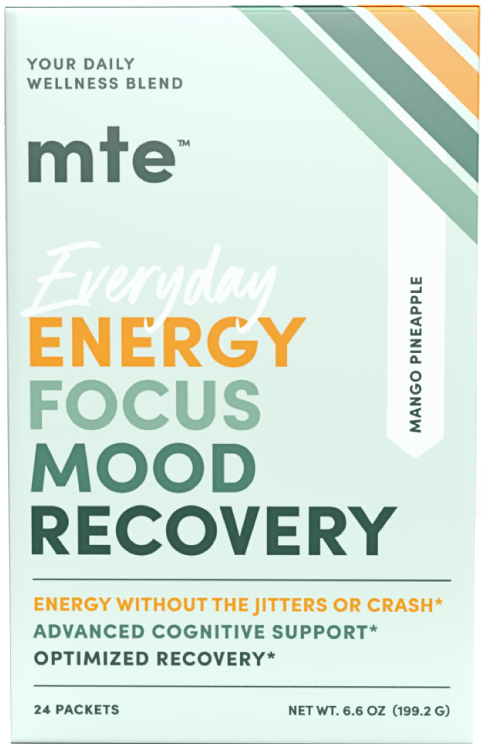
MTE Adaptogens & Nootropics: The Difference Between Energy & Synergy
Today’s energy drink market is saturated, crowded, and largely one-dimensional. If you’re looking for energy shots, you’ll find them, packed full of B vitamins, caffeine and other dubious energy-boosters. And what does our morning coffee really do for our health? How would you even stay awake without caffeine? And what might a blend of adaptogens, nootropics and superfoods do for our health as an alternative to caffeine?
So many questions… MTE is the answer.
We formulated MTE to fix the giant hole in the energy drink market: natural, holistic ingredients focused on overall health, vitality and longevity. Made for daily use, the health benefits of MTE have the potential to accumulate over time. Instead of focusing on the fact that you’re tired and trying to fix it with an energy boost, MTE focuses on why you’re tired and aims to give you the resources not to be. And that means more than energy; it means stress resilience, calm focus, immune support, and better athletic performance as well.
Here’s a rundown of MTE’s blend of wellness-boosting ingredients and what they do:
Stress Support
Ashwagandha: Ashwagandha may lower activity in the HPA axis, which is the group of brain structures that control stress responses. It is also thought to lower the activity of the central nervous system, producing a calming effect.
GABA: An amino acid and innate neurotransmitter, GABA is also a nootropic that calms neuron activity. It’s known to produce a calming effect, offering protection against the adverse sensory experiences of stress brought on by an overexcited nervous system.
L-Theanine: Theanine is an amino acid and potent nootropic that supports mood and stress management. It’s thought l-theanine acts by increasing alpha waves in the brain, associated with calm, and GABA production, which can reduce stress reactivity.
Calm Focus
Ashwagandha: This powerful adaptogen may have regenerative effects on nerve and soft tissues in the body, supporting the longevity of cognitive function. It may help improve concentration via the coupling of this function with the suppression of the nervous system. Clinical trials indicate the sitoindosides and acylsterylglucosides increase motor and cognition-related neurotransmission. This results in a calm focus.
L-Theanine: The same mechanisms that make l-theanine an effective nootropic for stress support also make it great for a cognitive boost without the jitters of a caffeine. Clinical trials support the claim that l-theanine increases the ability to concentrate on a task.
Cognitive Support
Maca: Clinical research indicates that the amino acids in the adaptogen maca may help support brain health by acting as a neuroprotectant and improving mitochondrial function. This adaptogen has also demonstrated potential to reduce memory impairments.
Saffron: Saffron is considered a nootropic and a superfood. One of its many abilities is cognitive support: active compounds in saffron may offer neuroprotective benefits, especially in the hippocampus, and saffron supplements have been observed to reduce memory-related cognitive impairments in clinical settings.
Sustained Energy
Paraxanthine: This energy-boosting nootropic is a natural metabolite of caffeine that offers all the great things about caffeine without the bad. Paraxanthine provides sustained, even support for energy without the jittery peak or post-caffeine crash. It has been shown to be safe – failing to cause side effects or disrupt sleep.
Amaranth: Because it’s a superfood, amaranth is packed with important nutrients, vitamins, and minerals that promote sustained energy, immunity, performance, and more. In fact, it’s been used in Mesoamerican cultures for millennia because of its ability to increase stamina.
Immune Support
Ashwagandha: The stress-protective indications of this adaptogen may reduce the energy your immune system spends on managing stress, which is a facet of why ashwagandha is thought to boost immune system activity. In addition, glucosides in ashwagandha may modulate both the innate and the adaptive immune systems, which may lead to improved the immune system capabilities.
GABA: Just as this nootropic acts as an inhibitor in the brain (we like to call it the calm-down chemical), it has a related relationship with the immune system. Current research indicates the immune system has GABAergic capacities, and that GABA may support the immune system via anti-inflammatory signals, notably T-cell responses to adverse stimuli.
Saffron: Saffron contains powerful antioxidants and other bioactive compounds that have repeatedly been observed in clinical studies to scavenge free radicals and facilitate DNA repair, including liver, kidney, lung, heart, and brain function.
Spirulina: This superfood is packed with vitamins and minerals that support your immune system function, and daily supplementation with spirulina may even decrease viral load levels while increasing hemoglobin.
Increased Physical Performance
Amaranth: Because this superfood is rich in nitrites, amaranth supplements promote physical endurance by supporting increased nitric oxide production. Amaranth may also support better muscle recovery and aerobic metabolism.
Ashwagandha: This adaptogen is thought to optimize the body’s use of oxygen, improving your VO2 max and, in turn, promoting respiratory and muscle health. This is another facet that contributes to ashwagandha’s immune-boosting potential. Research indicates ashwagandha may speed muscle recovery and help burn fat more efficiently.
Maca: This adaptogen is high in copper, manganese and potassium, which are known to support bone density while offering anti-inflammatory benefits. A study on athletes and maca supplements resulted in better athletic performance in all subjects after two weeks of daily maca consumption.
Paraxanthine: This nootropic for energy is also a nootropic for increased fat burn and decreased hunger. Studies have observed acute and chronic consumption of paraxanthine supplements improve several markers associated with thermogenesis, as well as increased endurance and muscle mass.
Mood Support
GABA: Several psychiatric conditions involving mood are associated with low GABA levels or impaired GABA function. Since this nootropic neurotransmitter inhibits neuronal activity, it may prevent mood dysregulation by modulating the nervous system, calming overexcited neurons.
Holy Basil: This plant is an ancient nootropic with well-documented health indications. Several studies on mood alone have consistently indicated that holy basil may improve mood and reduce stress and reactive unease. Clinical research has also observed a reduction in stress-induced psychosomatic sensations after taking holy basil.
Maca: Traditionally used for energy and vitality, this superfood-adaptogen hybrid has clinical research to support its usefulness potential to quell negative experiences and states of mind associated with emotional reactivity and offer overall mood support by modulating the HPA.
Reduced Inflammation
Ashwagandha: Ashwagandha has been observed to target inflammatory pathways and signal molecules in the body, which may contribute to a reduction in inflammatory markers and an increase in immune function. Key compounds modulate cytokine expression and inhibit protein kinase pathways, which may result in an anti-inflammatory effect.
Spirulina: This superfood is packed with vitamins and minerals that help modulate the body’s inflammatory responses, and clinical research suggests spirulina reduces inflammation by balancing different serum levels in the blood. It has also been observed to reduce oxidative stress.
Stress Resilience
Ashwagandha: This powerhouse of an adaptogen contains sitoindosides and acylsterylglucosides that regulate stress responses by controlling levels of stress hormones and the harmful proteins they produce.
Holy Basil: In research, the tulsi adaptogen has been observed to mitigate both metabolic and psychological symptoms of stress via blood sugar regulation and cognitive support.
Siberian Ginseng: This adaptogenic plant may help manage mental and physical responses to stress by modulating key chemicals in the blood. Siberian ginseng, also called eleuthero, may also promote better mental performance under stressful conditions.
Maca: As a nootropic and a superfood, one of the ways maca acts on the brain is by modulating activity in the brain structures that control stress responses. Clinical research shows that maca may be capable of boosting stress resilience via mood-enhancing properties and increasing antioxidant levels in the brain.
MTE: A Daily Wellness Blend for Focus, Energy, Mood, & More
We formulated MTE to offer comprehensive support so you can feel good, be healthy, and do more. A vegan alternative to coffee, energy drinks, and stimulants, MTE is a drink for focus, brain fog, mood, sleep, and more. And the addition of the best paraxanthine supplement on the market really just brings it all together.
Want to know more about MTE’s formulation? Stop by our Learn page for profiles on each and every ingredient in MTE. Don’t worry; there are only 11. And visit our Wellness Blog for health tips and more nerdy articles about the power of adaptogens, nootropics, and superfoods.



